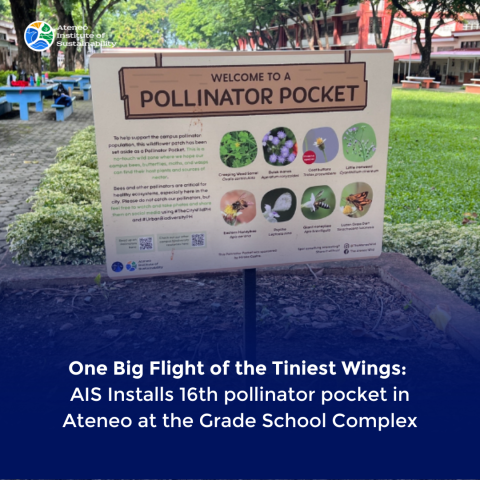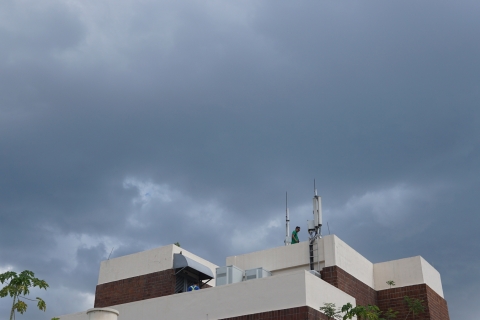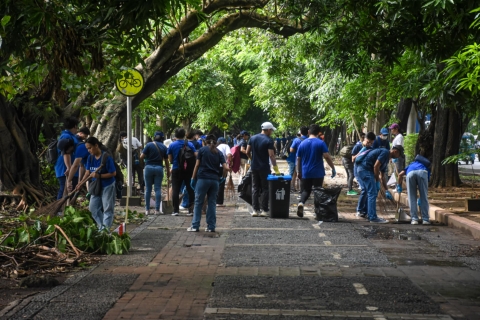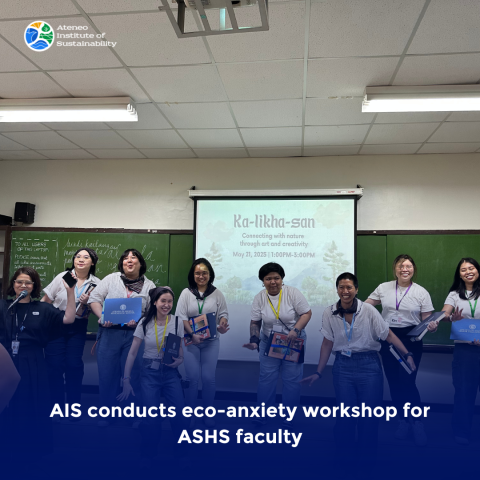Visiting Fulbright Fellow Dr Richard Kraince presents lecture on Ecological Education and Conservation Culture in Southeast Asia
24 Jun 2025
Dr Richard Kraince is a Fulbright scholar visiting the Ateneo Institute of Sustainability as part of an effort to develop a collaborative study of ecological education and conservation culture efforts in Indonesia, Malaysia and the Philippines. He is an Associate Professor of Cooperative & International Education at Antioch College in Yellow Springs, Ohio, USA. He has held previous posts within the Center for Asian & African Studies at El Colegio de México in Mexico City, Ohio University’s Center for International Studies, and the Asia Foundation in Jakarta.
The ASEAN University Network on Ecological Education and Culture (AUN-EEC), housed at the Ateneo Institute of Sustainability, in partnership with Ateneo Department of Biology, Ateneo Biodiversity Research Laboratory, and Ateneo Research Institute of Science and Engineering (ARISE) hosted a Fulbright fellow lecture entitled “Ecological Education and Conservation Culture in Southeast Asia” on 26 March 2025. This was a hybrid event, held at Ateneo de Manila University and simultaneously online via Zoom.
The event began with a keynote lecture by Dr Richard Kraince. This was followed by a panel-reactor discussion featuring Dr Delocado, Dr Kwik, and Dr Batomalaque.
In his lecture, Dr Kraince started with his background coming from Antioch College in Ohio. He then briefly talked about his time in Mexico and Indonesia to introduce his line of work. After this, Dr Kraince went through his presentation by going through his research questions.
"How are Southeast Asian universities instilling in future generations the quality of mind and cultural traditions necessary to preserve the region’s precious natural ecosystems?”
To answer this he shared about different things that piqued his interest with his time in the three different countries. He started with the initiatives he saw in Ateneo. These are the guided walks, biodiversity murals, and events for biodiversity. He then shared the initiatives in Indonesia. These are the orchid garden, and the birding and coffee culture.
"What emerging best practices in ecological education are becoming apparent among conservation ecologists, community educators, students, activists, and policy advocates active in the AUN-EEC network?”
Here, Dr Kraince shared his experience with the rafflesia hunt in Makiling, the botanical gardens and aquaculture in Universiti of Malaya, and the ASEAN initiatives regarding biodiversity specifically the primates and great hornbill in Langkawi, Malaysia.
“What are the lessons learned through engagement with members of local communities whose livelihoods depend on a healthy environment and conservation educators / nature enthusiasts internationally?”
In this part, Dr Kraince mentioned his experience visiting Iloilo and its initiatives on Mangroves and the esplanade. After this, he mentioned “Hope Spotting” a compendium on the PEER ManCORE project. This compendium looked into the mangrove diversity of Mindoro and delivered it in a way that children can understand. Saying that if the children can understand it they can also help their parents understand it.
His keynote lecture was followed by a panel-reactor discussion moderated by Ms Ethel Wagas. In this part of the program Dr Richard Kraince was joined by an esteemed panel in the field of biodiversity to talk about his lecture and answer the audience’s question. The panel together with Richard answered the questions with great eloquence, where the prevailing theme of the answers was that communication is very important in ecological education and instilling a culture of conservation.









